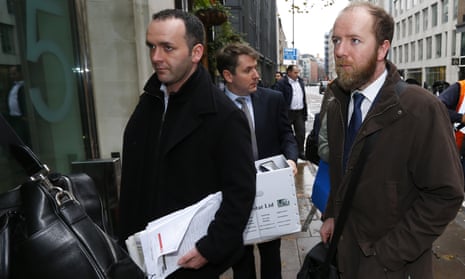Concern has been expressed within racing’s ruling body about the process by which Paul John regained a jockey’s licence after claiming to have stopped two horses in December. The revelation came on the final day of a week-long rehearing of the Jim Best case in which the Lewes trainer is accused of telling John to stop the horses, a charge he denies.
The British Horseracing Authority insist no deal was done with John in exchange for his willingness to give evidence against Best. But John has already been granted an amateur’s licence, the punishment for his part in the alleged offence having been limited to a six-month period during which he was not allowed to apply for a licence. The jockey was never formally banned from the sport or excluded from racecourses.
It emerged here that, when John applied for his licence this summer, his case was not even referred to the BHA’s licensing committee. It is BHA policy to limit the committee’s work and John’s case took a different track when Annette Baker, the BHA’s licensing team leader, decided the ruling body would not oppose granting John a licence.
That prompted a concerned email from the licensing committee chair, Richard Russell, which was read out before this disciplinary panel. “Why was Paul John not referred to us?” Russell asked. “The only reason I can even think of is that, until the Jim Best case has been retried, the BHA did not want Paul John going before the licensing committee or any of its other independent committees.
“Another of my committee made the comment: ‘I am sure nothing untoward has happened but it just savours a little bit of a done deal in a way that a decision by us cannot.’”
The panel also heard about an email from Paul Beeby, the BHA’s head of investigations, to Adam Brickell, who served as the regulator’s integrity director until September, asking for an update in relation to John’s situation. “Mr John is getting more difficult to keep on side,” Beeby wrote.
Invited to explain Beeby’s meaning, Louis Weston, the BHA’s barrister, said John had been concerned about when he was going to receive his licence and also about “possible repercussions for him giving evidence”.
Best’s barrister, Jonathan Laidlaw QC, said there was “a quite shocking lack of records” available from the BHA in relation to their early dealings with John. In particular, he said, there was no paper record of a meeting on 21 January between the jockey’s solicitor and the regulator.
“The BHA, despite my requests, have refused to put up a witness to deal with this critical area,” Laidlaw complained in his written submissions. Of that unexplained meeting, he wrote: “Quite what was offered, we will never know and the BHA are not prepared to allow me to ask any witness about these discussions. It’s not that the witness is unavailable, he won’t be put up.”
Asked by the panel who that “he” was, Laidlaw said he had been asking the BHA to produce Brickell for questioning. The panel said it had no power to compel a witness.
The panel expects to deliver its verdict on Best at some point next week and will presumably express a view in its reasons about whether the pre-hearing dealings between John and the BHA undermined the force of the jockey’s evidence to any extent. However the panel did express the firm view that a BHA email of 31 January, addressed to John’s solicitor, should have been disclosed to the defence long before the original hearing.
In the event, the BHA disclosed the email midway through that first hearing in February, after John’s solicitor had said it should be disclosed. Laidlaw asserted here that the original panel had been misled by the BHA’s initial position, although he conceded that had been “unintentional”.
John is the only witness against Best and the jockey’s credibility has been a live issue throughout this hearing. Laidlaw described him as “a young man who lies and makes things up” and said the documents disclosed by the BHA showed he had not been interviewed by the BHA before the regulator decided to issue charges against Best. At that time, BHA officials were relying on John’s representatives for a description of what evidence he could give.
“It was a fundamental error that nobody at the BHA appears to have even turned their mind to, that they made absolutely no effort to assess his credibility before issuing stopping charges,” Laidlaw wrote.
On behalf of the BHA, Weston submitted: “John’s account is credible and, notwithstanding the attack on his character, he is a credible witness … Being wilful, difficult, resistant to authority and posting offensive matters on Facebook does not support a tendency to calculated, premeditated, persistent dishonesty.”
Earlier, the panel heard evidence from a final witness, Paul Cooley, who was Best’s head lad at the time of the races but has since left the sport. Cooley said he had found John hard to work with and said the jockey lied about how often he exercised and how often he liked to drink.
Cooley said that, after giving evidence to the first hearing, he had been threatened near the yard by two men he knew by sight but did not identify here. “One of them grabbed my collar and said, ‘Shut your effing mouth, you effing grass, or else’,” Cooley recalled.
“Are you sure that happened?” Weston asked him. “Positive,” Cooley replied. “I wouldn’t have been scared to walk down the shop otherwise.”
Cooley accused the BHA of having “ruined” his career in the saddle, as he was told in January that his apprentice licence would not be renewed until after the Jim Best hearing. While the regulator had eventually backed down from that position, Cooley said he met with “excuses after excuses” and had never managed to recover his licence. BHA officials say they are waiting for Cooley’s response to correspondence.
